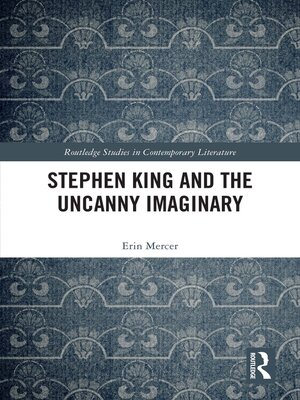Stephen King and the Uncanny Imaginary
ebook ∣ Routledge Studies in Contemporary Literature
By Erin Mercer

Sign up to save your library
With an OverDrive account, you can save your favorite libraries for at-a-glance information about availability. Find out more about OverDrive accounts.
Find this title in Libby, the library reading app by OverDrive.



Search for a digital library with this title
Title found at these libraries:
| Library Name | Distance |
|---|---|
| Loading... |
Offering an insightful examination of Stephen King's fiction, this book utilises a psychoanalytical approach drawing on Freud's theory of the uncanny. It demonstrates how entrenched King's work is in a literary tradition influenced by psychoanalytic theory, as well as the ways that King evades and amends Freud. Such an approach positions King's texts not simply as objects of interpretation that might yield latent meaning, but as producers of meaning. King can certainly be read through the lens of the uncanny, but this book also aims to consider the uncanny through the lens of King.
Organised around specific elements of the uncanny that can be found in King's fiction, this book explores the themes of death and the return of the dead, monstrosity, telepathy, inanimate objects becoming menacingly animate, and spooky children. Popular texts are considered, such as IT, The Shining, and Pet Sematary, as well as less discussed work, including The Institute, The Regulators and Desperation. The book's central argument is that King's uncanny motifs offer insightful commentary on what is repressed in contemporary culture and insist on the failure of scientific rationalism to explain the world. King's uncanny imaginary rejects dualistic notions of an experiencing self in an inert physical world and insists that psychic experience is bound up with the environmental.
This book will be of interest to students and scholars of contemporary and popular literature, gothic and horror studies, and cultural studies.







